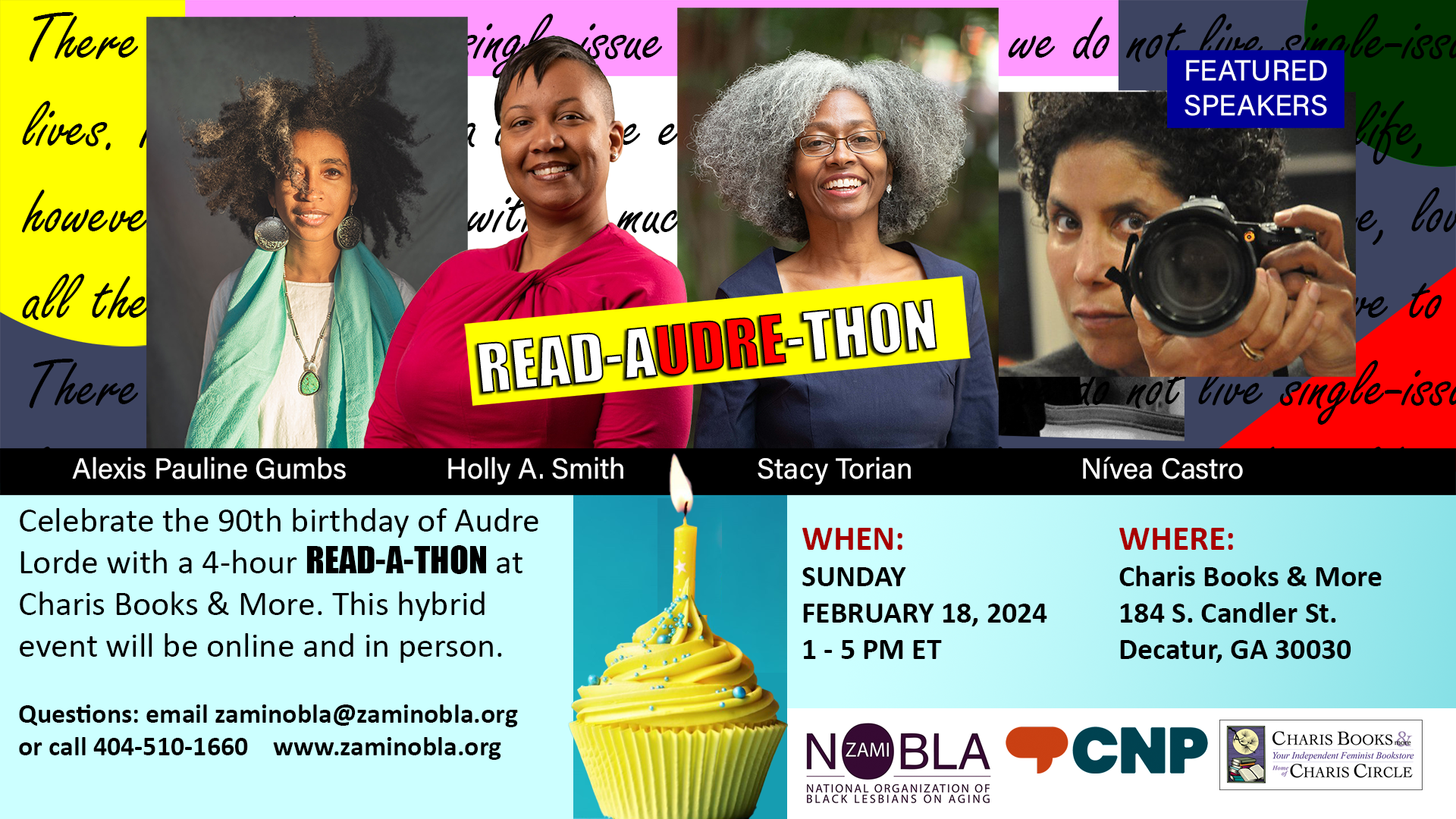Audre Lorde Read-a-Thon Hopes to Celebrate Author’s 90th Birthday, Build Intergenerational Dialogue

Event Celebrates Late Author’s 90th Birthday
“To whom do I owe the power behind my voice, what strength I have become, yeasting up like sudden blood from under the bruised skin’s blister?”
It was with these words that poet Audre Lorde began her groundbreaking 1982 work “Zami: A New Spelling of My Name”, in the process launching earning a reputation as a master poet and Black lesbian literary icon that has endured years after her death.
This Black History Month, Decatur’s landmark Charis Books & More will fete the author with a four-hour Audre Read-a-Thon event on Sunday February 18 - what would have been the late writer’s 90th birthday.
“With her 90th birthday coming up on February 18, it was important for us to mark that in a very significant way and what better way to do that than a readathon to introduce new readers to her work,” says Mary Anne Adams Founder of Zami Nobla National Organization of Black Lesbians on Aging, an event sponsor.
Held from 1 p.m. to 5 p.m. the event will include readings by Alexis Pauline Gumbs, author of the upcoming book “Survival Is a Promise, The Eternal Life of Audre Lorde” as well as talks by personal friends of the author, whose “Zami” is widely regarded as a classic in the canon of Black lesbian literature.
The event is just one of many nationwide as poetry fans honor the larger-than-life poet; others included the annual Bayard Rustin/Audre Lorde Breakfast, held in Atlanta last month, as well as Audre Lorde week at her alma mater Columbia University, in New York this February.
A decades-long fan of the late poet, Adams says she understands why the author’s work continues to resonate long after her death.
“Her book ‘Sister Outsider’ is my bible,” Adams says. “Every time I read it, I find something new.”
Adams says later works like Lorde’s “The Cancer Journals” continued the poet’s trend of writing that touches readers on a personal level, whatever their life stage.
“As a 17-year cancer survivor myself, ‘The Cancer Journals’ really spoke to me in a deeply personal way,” says Adams, whose group hopes events like the read-a-thon appeal to older fans and stoke new ones.
The Makings of an Icon
Born Audrey Geraldine Lorde to Caribbean parents in 1934, Lorde grew up in New York City, NY. Severely nearsighted, Lorde nonetheless found solace in writing; she wrote her first poem in the 8th grade.
Lorde eventually studied at New York’s Hunter College and Columbia University. It was later, while working as a facilitator of undergraduate workshops, she developed a deep need to use her writing to confront all forms of injustice.
Lorde’s poetry and prose soon took on its trademark activist bent, touching on the trials and joys of Lorde’s intersectional identity as a self-described "Black, lesbian, feminist, socialist, mother, warrior, poet.”
Works like “Coal” (1976) and “The Black Unicorn” (1978) paved the way for what would go on to be breakout works like “ Zami” in which Lorde delves deep into her burgeoning LGBT identity.
“Zami” – the namesake of Adams’ activist group - would go on to become among her most popular works.
“I was just a young Black woman questioning my identity, lost, and somebody gave me her work,” Adams says. “It was just like home.”
Lorde died from metastasized breast cancer in 1992.
Mary Anne Adams (Image Courtesy of Subject)
Keeping the Fires Burning
But even as Adams’ group celebrates the author, it laments the challenge of maintaining the broader legacy of both Black lesbian literature and community.
The Atlanta activist points to the dearth of intergenerational dialogue between older and younger Black lesbians – especially troubling in a city rich in both demographic groups, she says.
“I do think that unfortunately the LGBTQIA queer gender expansive community is very youth oriented and continues to be,” Adams says. “Elders, by and large are invisible.”
It is estimated that there are approximately 2.7 million LGBT adults aged 50 and older in the United States, 1.1 million of whom are 65 and older. Recent years have seen a surge in attention to the plight of older LGBTQ+ men and women, who can face discrimination surrounding everything from assisted living to end-of-life decisions. Experts say LGBT elders also are often disproportionately affected by poverty and mental health issues related to a lifetime of discrimination.
Adams, 69, says elder invisibility hurts lesbians both older and young. Without the support of younger women, for example, she says Black lesbian elders run the risk of falling through the cracks of their communities. Younger Black lesbians, meanwhile, can gain strength from knowing and understanding their rich legacy.
With some 2,000 members and supporters spread across the country, Zami Nobla has spent over a decade advocating for Black lesbians ages 40 and over. Their programs include efforts to provide housing security and rental assistance for Black lesbian elders and even conducting region-wide research into the top issues facing older lesbians of color.
Perhaps most importantly, Adams says they maintain a strong connection with younger women, meeting bi-weekly with LGBTQ+. Some, she says, will be at the event.
Introducing them to their poetic foremothers is just the first step in maintaining a Black lesbian legacy, but Adams says it’s an important one.
“There’s an African proverb that says as long as you speak my name, I shall live forever. And that’s something we intend to do in terms of Audre Lorde,” Adams says.
Dionne Walker-Bing is an Atlanta-based reporter with over a decade of experience. Walker offers a distinct voice and unique skill for capturing the stories of diverse communities, perfected while writing for The Associated Press, The Capital-Gazette (Annapolis), and a variety of other daily publications throughout the Southeast. When she’s not writing features, Walker is busy traveling, crafting, or perfecting her vinyasa yoga skills.

